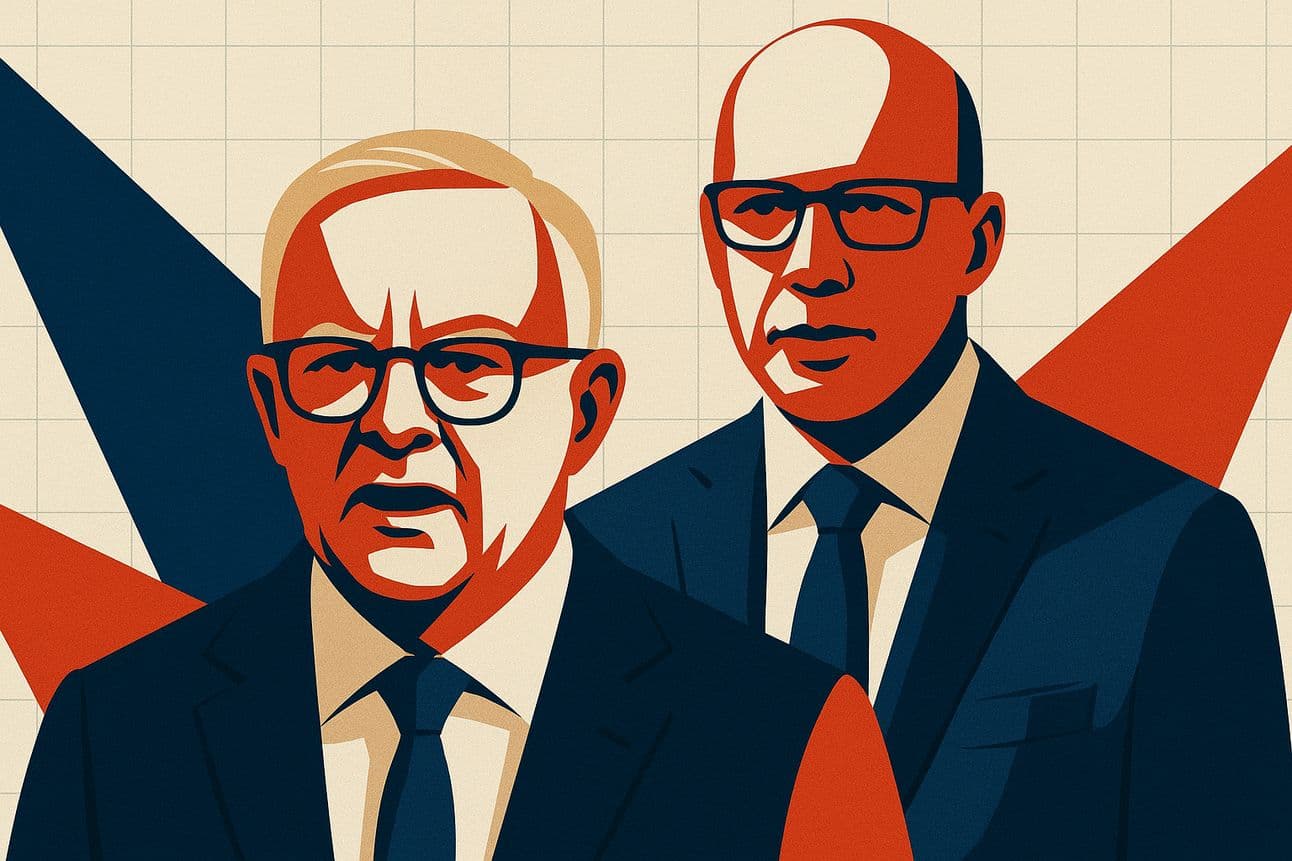
A Tale of Two Elections
May 5, 2025
Subscribe to our newsletter (for free)
Get the latest articles delivered right to your inbox.
Australian PM Anthony Albanese was reelected by a landslide in Saturday’s election, trouncing the Liberal-National coalition and easily clearing the 76 parliamentary seat threshold needed to secure a majority. It was the second election in only a week, after Canada, that was radically reshaped by events in Trump’s America.
Dutton had started the year with a commanding lead over Albanese’s Labor party. Even at the end of February, YouGov polling put his net satisfaction rate at 10 percentage points above Albanese. This, however, narrowed over March and then subsequently collapsed at the start of April. Dutton himself lost his seat of 24 years in Saturday’s wipeout, marking a final humiliation for the outgoing Liberal leader.
The parallels with last week’s election in Canada are clear. Under new leadership from Mark Carney and reinvigorated by Trump’s threats to turn Canada into the “51st state”, the once-doomed Liberal party reversed a 27 point poll lead by Pierre Polievre’s Conservatives.
The Canadian and Australian elections had similar dynamics and core issues. Both incumbent parties had been weighed down by concerns over cost of living and housing. In both cases, a more aggressive style of populist opposition politics sought to link these issues to broader right wing themes around culture wars, immigration and the size of the state. Canada’s Poilievre and Australia’s Dutton both tried to channel a Trumpian anti-establishment sentiment, with disastrous results.
The failure of this approach is particularly clear when you consider the extent of the economic challenges the incumbent Albanese government faced. Housing has been growing steadily less affordable over the past 20 years, with the average residential house price now standing at more than 16 times average annual disposable income. The overall consumer price index has risen by around 14% since January 2022, with sharp increases in the cost of food and electricity.
Dutton explicitly linked migration to the cost of living, stating that the Albanese government had “left a sugar bag on the table” that was “providing incentive for people to stay, not to leave, which is part of the housing crisis that they’ve created”. And whilst resolving Australia’s housing crisis is likely much more complex than simply cutting migration, it remains true that net migration into Australia is very high.
But despite the importance of the cost of living message, Dutton’s style and policy proposals turned toxic after Trump returned to the White House. His language around government spending felt particularly MAGA-inspired, with threats to cut more than 40,000 government jobs and the appointment of a shadow minister for “government efficiency” looking like a nod to Musk’s largely controversial DOGE initiative in the US. He was later forced to walk away from his promised cuts to the civil service, in a public reversal that was nothing short of humiliating.
Trump has affected these elections in two ways.
First, the image of a bullying, unpredictable United States has created a rally-to-the-flag effect, in which voters lean back toward the incumbent government as it responds to the Trump threat. In both Australia and Canada, this has meant renewed support for the current centre-left government.
Second, the right wing populist approach taken by both Poilievre and Dutton - a focus on migration, calls for aggressive cuts to government spending, and attacks on the media - have been tarred by association with Trump. Whilst this brand of politics once felt fresh and impactful, an erratic and incoherent Trump administration has made it increasingly sound contrived, and worse still, stupid.
Australia has not been a major target of Trump’s tariff threats, getting only a 10% flat rate in the Liberation Day package, and is much less dependent on US trade than Canada. However, it is also notable how the unpredictability of the US as a trade and security partner has led to a softening tone on China. Relations with China, once a hot button issue in Australian politics, got relatively little airtime, with both sides treading carefully given both the importance of Chinese commodity demand to the Australian economy and previous political spats between Canberra and Beijing. In a recent debate, Dutton labelled China as the biggest threat to Australian security, whilst Albanese sought to take a more equivocal stance by stating that relations with PRC should be handled “diplomatically”. As Trump trashes Washington’s traditional alliances, other countries may also start to play nicer with Beijing.
The upshot is clear: Trump 2.0 might be popular with Republicans in the US, but it is increasingly unpalatable in other Western democracies. This will undermine the White House’s international agenda by empowering anti-Trump figures in previously US-aligned countries and pushing these countries to be more cooperative with China. As Trump, Vance and Rubio lecture their allies on democracy and liberal values, they will find that these same liberal values start to bite back.
Subscribe to our newsletter (for free)
Get the latest articles delivered right to your inbox.